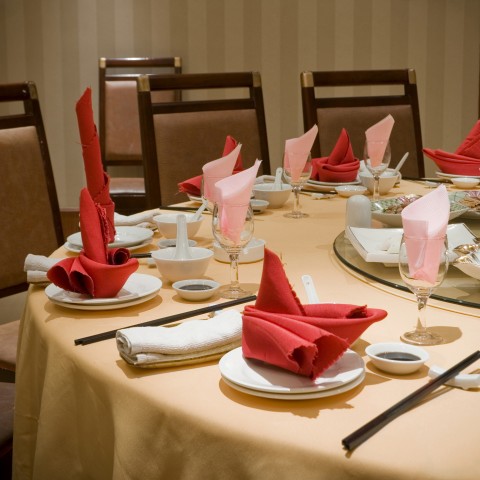
Like many other places, food is an important part of Brazilian culture. So if you are planning on going to Brazil at any time, odds are you are going to eat out at a restaurant. If this makes you feel a bit anxious and nervous about how to communicate correctly, don’t worry! This article will teach you everything you need to know to speak Portuguese in restaurants, from basic phrases all the way to how you can order your food in Portuguese.
Of course, the experience of going to a restaurant includes many other aspects, like making a reservation via telephone and leaving tips. We will include some relevant information so you will know what to do!
With sample dialogues and a list of phrases for each step of the restaurant experience in Portuguese, you will learn everything you need to enjoy the moment to the max – without worrying about what to say.

Esta é a nossa melhor mesa. (“This is our best table.”)
 Table of Contents
Table of Contents
- Before Dining Out
- During Dining
- After Dining
- Continue Learning More Portuguese with PortuguesePod101
1. Before Dining Out
A- Booking a Table
Most restaurants in Brazil don’t require a reservation unless you have a big party of people. More often than not, you can simply arrive and find a table. It might also be the case that, if the restaurant is full, they will ask you to wait for a few minutes.
However, if you are going to a particularly popular or fancy restaurant, then a reservation might be needed. The easiest way to check is to visit their website or social media accounts. Then, you can either make a reservation online or give them a call. A reservation for dinner can sometimes be made on the same day, but it all depends on the popularity of the establishment.
B- What Do I Say?
Let’s take a look at some essential vocabulary first.
| Portuguese | English |
| Reservar | To book |
| Uma reserva | A reservation |
| Uma mesa | A table |
| Um jantar | A dinner |
| Um almoço | A lunch |
| Um horário | An hour, a time |
| Não fumante | Non-smoking |
Here are some sentences you can use:
- Vocês tem disponibilidade para hoje à noite? (“Do you have availability for tonight?”)
- É possível reservar uma mesa para amanhã? (“Is it possible to book a table for tomorrow?”)
- Quanto tempo é preciso esperar? (“How long do I have to wait?”)
And the restaurant employee might answer with:
- Sim, temos disponibilidade. (“Yes, we have availability/places.”)
- Está reservado. (“It’s booked.”)
- Infelizmente não temos mais mesas para essa data. (“Unfortunately, we don’t have any tables for that date.”)
If you feel comfortable enough, you can put all the necessary information in one single phrase. This way, there will be less back and forth between you and the restaurant.
- Gostaria de reservar uma mesa para amanhã, às 13h, para cinco pessoas. (“I would like to reserve a table for tomorrow at 1 pm for five people.”)
This is an example of how the call to make a reservation can go. As in the phrases above, green indicates the client, and red indicates the restaurant.
| Restaurante A Flor da Lapa, bom dia. (“A Flor da Lapa restaurante, good morning.”) Olá, bom dia. Eu gostaria de reservar uma mesa para hoje à noite. (“Good morning. I’d like to reserve a table for tonight.”) Claro, para quantas pessoas? (“Of course, for how many people?”) Para quatro pessoas, por favor. (“For four people, please.”) Certo. Temos mesas no lado de dentro e também algumas no exterior, o que prefere? (“Right. We have tables inside and also some outside, what do you prefer?”) Somos fumantes, então do lado de fora é melhor. (“We are smokers, so outside is better.”) Ok. E para que horas é a reserva? (“Ok. And what time is the reservation for?”) Para às 20h. (“At 8 pm.”) Perfeito. Está reservado para hoje à noite, às 20h, uma mesa para quatro pessoas no exterior. (“Perfect. A table for four people, outside, is reserved for tonight at 8 pm.”) Ótimo, muito obrigado(a)! (“Great, thank you very much!”) |
A quick note about smoking: in Brazil, you can’t smoke inside restaurants (or anywhere indoors, in fact). So keep your cigarettes for after your meal!
- ➜ Listen to this vocabulary list on Phrases at the Restaurant, available for free at PortuguesePod101.

It’s a good idea to book a table if there are a lot of people at your party
2. During Dining
A- Arriving at the Restaurant
When you arrive at the restaurant, there are two possibilities: either you already booked a table, or you didn’t.
In the first case, you can say something like:
- Olá, boa noite. Temos uma reserva para quatro pessoas. (“Hello, goodnight. We have a reservation for four people.”)
- Olá, tenho uma reserva no nome de Maria Paula. (“Hello, I have a reservation in the name of Maria Paula.”)
If you don’t have a reservation, you can say:
- Olá. Eu não tenho uma reserva, mas é possível ter uma mesa para dois? (“Hi. I don’t have a reservation, but is it possible to have a table for two?”)
- Oi, gostaria de uma mesa pra quatro, por favor. (“Hi, I’d like a table for four, please.”)
Here is how it can look in a sample dialogue:
| Olá, boa noite. Vocês tem uma mesa para três pessoas? (“Hello, goodnight. Do you have a table for three people?”) O senhor tem reserva? (“Do you have a reservation?”) Não, não tenho. (“No, I don’t.”) Se puderem aguardar cerca de 10 minutos, teremos uma mesa livre. (“If you can wait about 10 minutes, we will have a free table.”) Perfeito, vamos aguardar então. (“Perfect, we will wait then.”) |

Uma mesa do lado de fora. (“A table outside.”)
B- Asking for the Menu and Ordering Food
Once you are inside and sitting, you will probably receive the menu. Of course, you can also ask for the menu at the entrance, before sitting down, so you can check if you like their offerings or not.
If you are eating at a self-service restaurant, you probably won’t have a menu – perhaps just a drink menu. A similar thing can happen in all-you-can-eat establishments, called rodízios in Brazil. In this case, you decide if you want a portion of the food as the waiter passes by your table with the food.
Let’s first take a look at important vocabulary:
| Portuguese | English |
| Um cardápio, um menu | A menu |
| Um prato | A dish |
| Um prato do dia | A dish of the day, a day’s special |
| Uma sobremesa | A dessert |
| Uma bebida | A drink |
| Um garçom, uma garçonete | A waiter, a waitress |
At this stage, here are the phrases you can use or hear:
- Aqui está o cardápio. (“Here is the menu.”)
- O que deseja? (“What would you like to order?”)
- Com licença, você pode nos trazer o menu? (“Excuse me, can you bring us the menu?”)
- Qual é o prato do dia? (“What’s today’s special?”)
- Qual prato você sugere? (“What dish would you suggest?”)
- Posso ver a carta de bebidas? (“May I see the drinks’ menu?”)
- Vocês têm opções vegetarianas/veganas? (“Do you have vegetarian/vegan options?”)
- Eu tenho alergia a frutos do mar. (“I have a seafood allergy.”)
- O que vem neste prato? (“What’s on this plate?”)
- Você acha que este prato é suficiente para duas pessoas? (“Do you think this dish is enough for two people?”)
- Gostaria da carne ao ponto / mal passada / bem passada. (“I would like the meat medium / rare / well done.”)
The dialogue with the waiter or waitress can go something like this:
| Com licença, vocês já sabem o que querem beber? (“Excuse me, do you already know what you want to drink?”) Client 1: Sim, eu quero uma limonada. (“Yes, I want a lemonade.”) Client 2: E eu gostaria de uma garrafa de água, por favor. (“And I’d like a bottle of water, please.”) Client 3: Eu não quero nada por enquanto, obrigada. (“I don’t want anything for now, thank you.”) Perfeito. E para comer, já se decidiram? (“Perfect. And to eat, have you already decided?”) Client 1: Ainda não. Estou em dúvida entre estes dois pratos. O que você recomenda? (“Not yet. I’m torn between these two dishes. What do you recommend?”) Os dois são muito bons, mas para quem gosta de nozes, recomendo este Canelloni al Pesto. (“Both are very good, but for those who like nuts, I recommend this Canelloni al Pesto.”) Client 1: Eu tenho alergia a nozes, então vou querer a quiche. (“I’m allergic to nuts, so I’ll have the quiche.”) |
C- During the Meal
Once you have your meal, the restaurant staff might ask you a few questions:
- Está tudo bem? (“It’s everything going well?”)
- Gostaram do prato? (“Did you like the dish?”)
- Posso retirar os pratos? (“Can I clear the dishes?”)
And here are some things you might ask for or say:
- Pode me trazer um pouco de sal? (“Can you bring me some salt?”)
- Pode trazer mais guardanapos, por favor? (“Can you bring more napkins, please?”)
- Com licença, eu vou querer mais uma água. (“Excuse me, I’ll have another water.”)
- Com licença, minha faca caiu. Pode trazer outra, por favor? (“Excuse me, I dropped my knife. Can you bring another one please?”)
- Estava tudo ótimo! (“Everything was great!”)
- Estava delicioso. (“It was delicious.”)
- As batatas estavam um pouco insossas / sem sal. (“The potatoes were a little bland/unsalted.”)
After you finish eating the main dish, the waiter or waitress may ask if you want anything else:
- Querem algo mais? (“Do you want anything else?”)
- Gostariam de ver o menu de sobremesas? (Would you like to see the dessert menu?)
- Vão querer sobremesas, ou um café? (Will you want desserts or a coffee?)
- ➜ If you want to learn more about Brazilian table manners, check this audio lesson by PortuguesePod101!

It’s impossible not to overeat in a rodízio (“all-you-can-eat”)!
3. After Dining
Now that you are done eating and had your dessert and coffee, time to pay the bill. But before that, you may want to ask to take the leftovers. This is quite common in Brazil, so feel free to ask for a to-go box called quentinha (literally “small hot”) or embalagem para viagem (literally “take out package”).
- É possível colocar isso numa embalagem para viagem? (“Is it possible to put that in a to-go box?”)
- Pode colocar o restante numa quentinha, por favor? (“Can you put the rest in a to-go box, please?”)
When it comes to paying the bill, here are some words that you might come across:
| Portuguese | English |
| Uma conta | A bill |
| Um pagamento | A payment |
| Um cartão de crédito | A credit card |
| Um cartão de débito | A debit card |
| Um recibo | A payment receipt |
| Uma gorjeta | A tip |
And here are the phrases you should know:
- A conta, por favor. (“The bill, please.”)
- Pode trazer a conta, por favor? (“Can you bring the bill, please?”)
- Claro, já trago a conta. (“Of course, I’ll bring the bill.”)
- Podem pagar diretamente no balcão. (“You can pay directly at the counter.”)
- O pagamento é junto ou separado? (“Are you paying together or separately?”)
- Vamos separar. (“We’ll split.”)
- Eu pagarei para todos. (“I’ll pay for everyone.”)
- Vocês aceitam cartão (de crédito/de débito)? (“Do you accept (credit/debit) card?”)
- Pode me dar o recibo, por favor? (“Can you give me the receipt, please?”)
A- Should You Pay Tips?
In Brazil, the bill normally comes with the 10% tip added (called gorjeta in Portuguese). Of course, it isn’t mandatory to pay for it, but it is customary. If you are particularly pleased with the service, it’s seen with good eyes to tip a bit more: 15% to 20% of the bill amount. Usually, the tip can be paid separately, in coins or cash, and given directly to the waiter. You can always ask the waiter how you should pay the tip, in case it isn’t clear.
- ➜ You can discover more basic Portuguese phrases for restaurants in this vocabulary list, freely available on PortuguesePod101.

Gorjeta (“tip”)
4. Continue Learning More Portuguese with PortuguesePod101
Now that you learned the Portuguese phrases to use in Brazilian restaurants, hope you are ready to go out and have great meals! There are many different types of restaurants to discover during your time in Brazil, and now you have the tools to make the most of it.
What did you think of the article? Do you think this guide was complete? If we missed any important Portuguese phrases for restaurants, let us know in the comments!
Now, continue learning Portuguese with the hundreds of free Portuguese resources and the many vocabulary lists available on PortuguesePod101.com. Go ahead and choose your favorite tools to expand your learning opportunities.
If you want to take your learning experience further, members of PortuguesePod101.com get access to the largest language lesson library in the world, with thousands of real lessons by real teachers. With Premium PLUS, you will have your own personalized learning program with weekly assignments based on your needs! Perfect for anyone who wants to learn from anywhere, feel motivated, and be ready to speak Portuguese with confidence. And in the meantime, continue exploring PortuguesePod101!










